Territorial impact of COVID-19 on European tourism
|
© European Union, 2021 |
The tourism sector is one of the sectors most heavily affected by the COVID-19 pandemic. This goes beyond the 2020 and 2021 tourist seasons. Also future trends shaping the tourism sector have been affected. Knowing more about this may help the sector to recover and reinvent itself in the next years, or pose new challenges.
The following presents key findings from a survey conducted between January and March 2021. Key players in the tourism sector provided insights on the impacts of COVID across Europe's tourism areas, on trends, and on possible policy initiatives to make the sector more resilient.
We thank all respondents for sharing their insights. Your contributions to the survey helps us to further our work on the study "regional economic impact of the COVID crisis on the tourist sector in the EU" for DG REGIO.
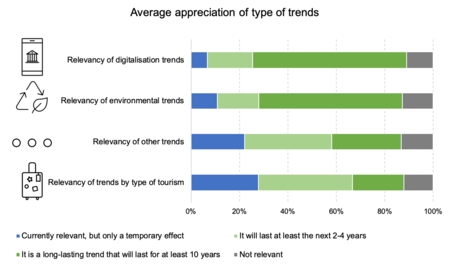
Trends relevant for tourism areas
Desk studies illustrated the existence of a large variety of trends that define the development of tourism areas in Europe and across the world. This includes trends on the dimension and type of tourism, on digitalisation, and on the environment and sustainability. Survey findings helped to differentiate short-term trends related to the COVID pandemic from trends that are likely to stay in the next years.
Digitalisation trends are most likely here to stay. On average 64% of the survey respondents indicated that digitalisation trends will continue for at least the next 10 years. Also, a large share of respondents assume that environmental trends are long-lasting. On the contrary, trends related to the dimension and type of tourism in a region are largely expected to last the next 2-4 years (39%), or are assessed as temporary (28%).
Click on the sub-headings to read more about temporal, short-term and long-term trends.
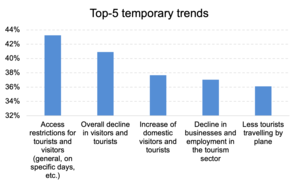
Several tendencies currently observed are closely related the COVID-19 pandemic. The following five current tendencies are the most important trends that may loose importance soon:
- ◊ Access restrictions for tourists and visitors,
- ◊ Overall decline in visitors and tourists,
- ◊ Increase of domestic visitors and tourists,
- ◊ Decline in businesses and employment in the sector,
- ◊ Less tourists traveling by plane.
Survey findings suggest thus that the tourism sector recovers once restrictions to contain further spreading of the COVID-19 pandemic are lifted.
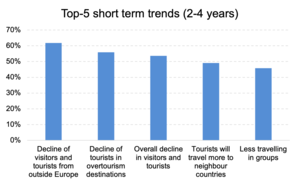
Over the next 2-4 years the following tendencies remain most important according to the survey respondents:
- ◊ A decline of visitors from outside Europe,
- ◊ Decline of tourist in destinations that pre-COVID times coped with overtourism,
- ◊ An overall decline in visitors and tourists,
- ◊ An increase of tourists visiting neighbouring countries,
- ◊ Less travelling in groups compared to pre-COVID times.
Survey findings suggest thus that some of the effects of the pandemic requires some time to recover, such as travelling over large distance. Survey findings also suggest that it may take some time for tourists to feel comfortable among many persons again.
Whereas survey findings on temporary trends suggest a swift recovery of the tourism sector, these findings illustrate that a recovery of the tourism sector may be unequally distributed across Europe. The most important trends over 2-4 years suggest that tourism regions that largely rely on tourists from far away as well as popular destinations take longer to recover than other areas.
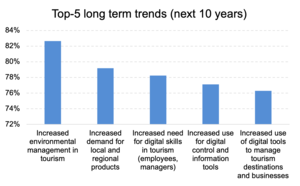
In the long term, survey respondents expect an increased focus on environmental impact and digitalisation in tourism. A majority of survey respondents referred to trends in these fields when assessing the importance of trends for the next 10 years. The five most important long-term trends are:
- ◊
Increased environmental management in tourism, - ◊ Increased demand for local and regional products,
- ◊ Increased need for skills in tourism,
- ◊ Increased use for digital control and information tools,
- ◊ Increased use of digital tools to manage tourism destinations and businesses.
Desk research confirms that environmental and digitalisation trends gained importance during the pandemic. Policy initiatives could further enhance these tendencies, making sure that these trends are here to stay, and limit challenges to materialise these trends in all European tourism areas.
Policy initiatives to making tourism resilient
Understanding relevant trends facilitates policy making. After all, policies aim at supporting tourism in the mid to long term. A variety of policies is already in place to make tourism resilient in case of an economic downturn. These policies may have been recently introduced in response to COVID-19 or were introduced previously. At the same time, trends may change the needs for certain policies to keep tourism prepared in case of crises.
Programme authorities for European Regional Development Fund programmes play a key role to initiate and implement relevant policy initiatives. 65% of the respondents indicated national or regional authorities responsible for the implementation of these programmes as main player initiating or implementing policy initiatives. In many cases these programme authorities would cooperate with organisations managing, coordinating and promoting tourism destinations. 46% of the respondents assessed tourism destination management organisations as relevant player to initiate or implement policy initiatives. 37% of the respondents see tourism businesses in charge and 31% see regional authorities other than EU programme bodies in charge. National authorities (22%) and civil society organisations (13%) are least often indicated as possible player to be in charge of policy initiatives.
Policy initiatives to promote digitalisation and strengthening partnerships are currently most in place preparing tourism for the future. These are among the types of policy instruments most frequently indicated by survey respondents. Also initiatives to improve coordination between players at local, regional and national levels as well as initiatives to promote research and innovation are often referred to. Initiatives to promote circular approaches and reducing the use of resources as well as initiatives to learn from others are current least often in place.
Policy initiatives promoting research, innovation and the use of technology are most relevant for future crises. In addition, policy initiatives to support SMEs and to promote digitalisation are important for the future. Initiatives to improve governance and integrated destination management and to promote circular approaches are perceived as least important for future crises.
Policy initiatives to promote digitalisation and strengthening partnerships become less relevant for future crises. Survey respondents indicate thus different types of policy initiatives as most relevant to keep tourism resilient for future crises. The figure below illustrates the relative importance of different types of policy instruments to make tourism resilient for the future (green and blue shades of the bar). All policy initiatives become more important for the future (illustrated by the green shades), except for initiatives promoting digitalisation and to strengthen partnerships. Fewer respondents indicated these types of policy initiatives as relevant to make tourism resilient for future crises compared to respondents that indicated these policy initiatives as currently in place.
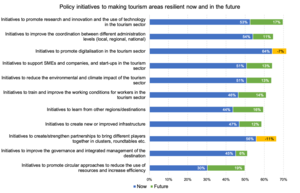
About
Information on this webpage is part of the study “regional economic impact of the COVID crisis on the tourist sector in the EU”. Spatial Foresight, t33, Anysolution and NECSTouR perform this study for the European Commission, DG regional and urban policy.
Survey findings are used to enrich the study's findings from desktop studies and case study research. All information will feed into a final report for the European Commission, DG for Regional and Urban Policy. The report shall highlight proposals for the use of EU Cohesion Policy, especially the European Regional Development Fund, to address challenges for the tourism sector and in different types of tourism areas. The final report is expected for autumn 2021.
Findings presented on this page do not reflect the opinion of the European Commission. Contents may not be further distributed without reference to the above-mentioned study team and study for the European Commission.

